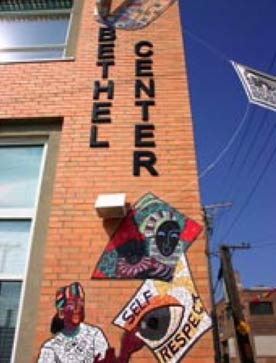The big-box environment also encourages creaming—choosing people who are the easiest to help. Michael Allen, a Washington, D.C.-based civil-rights lawyer formerly with the Bazelon Center for Mental Health Law, says HUD has encouraged creaming by demanding measurable results in federal homelessness programs, such as tallies of successful graduates who move on to conventional housing. He says property managers pick tenants who are “easiest to serve and [have] the best attitude” and label people with mental disabilities or tendencies to assert their rights as troublemakers. Jennifer Mathis, deputy legal director at Bazelon, says many supportive-housing programs impose such rigid behavioral rules on tenants that “you basically can’t have a mental illness” to stay there.
Boden says some programs foster “inherent creaming by understaffing and under-funding the support portion of the program.” Managers don’t have adequate resources to serve the most disabled, so they reject or evict them. He equates this breakdown in care to “a system where the nurse goes out to the emergency room and sees who’s got the least amount of injury and brings them in because there’s no doctors. Does that make the nurse an asshole? I no longer agree that it does. I used to think it did.”
DAH’s Trotz sees a growing “second wave” of supportive-housing thinking that recognizes the need to “not kick people out on their conditions.” He says within the last year “we had many difficult conversations with our [service] provider community to say ‘let’s raise the bar.’” But, he believes that, while management may agree, change requires “educating down to” property managers and support staff.
If trickle-down enlightenment fails to reform the big-box model, the scattered-site model presents a hopeful alternative. Unlike the big-box practice of segregating tenants according to disability, scattered-site programs rent apartments for their clients in private buildings and provide on-site services as needed. One of the most acclaimed scattered-site programs is New York City’s Pathways to Housing. Run by Dr. Sam Tsemberis, Pathways houses survivors of long-term street homelessness. Tenants receive visits from an expert interdisciplinary Assertive Community Treatment team of medical, psychiatric, and social-work professionals.
Some scattered-site programs, such as JOIN in Portland, Ore., use non-credentialed peer counselors. JOIN’s executive director, Marc Jolin, says his organization doesn’t provide professional counseling, but rather offers “friendship and support.” When problems come up that jeopardize tenants’ housing, says Jolin, “we get to the problems before the landlords figure them out.” If a tenant does have to leave a particular rental, JOIN helps with the move and stays in touch at the next placement—an advantage over big-box programs that cut off services when a tenant leaves.
Tsemberis calls for supportive housing that adopts a “radically consumer-driven” approach that places tenants in charge of their own treatment and services: Instead of providing care that has been tailored for a building, he advocates designing treatment and services that address the needs of the individual. “Say ‘How can I help you?’ and mean it,” he advises. As trust builds, he says, it becomes OK, for example, to ask someone not to pace at night if it bothers neighbors.
Tsemberis and civil-rights lawyer Michael Allen argue for separating housing from mental-health and addiction treatment. Tsemberis says when people are placed in situations where housing and treatment are dependent on one another, they have a tendency to revert to behaviors such as hoarding, withdrawal, and drug abuse. They begin a cycle that can eventually get them evicted, and that only adds to their suffering.
Bazelon’s Jennifer Mathis says, “The supportive scattered-site model seems to be the most successful model, and it’s the least expensive.” Tsemberis estimates that housing and services under Pathways to Housing costs $20,000 to $22,000 per person per year, compared with $28,000 to $35,000 for a New York City shelter cot with services, or costs of $40,000 and up for a supportive-housing residential hotel room with services.
For all its strengths, scattered-site housing for the mentally disabled may not be the perfect approach either. JOIN’s Jolin says, “You can bureaucratize anything, dehumanize anything.” The real need is for mentally disabled poor people to receive services based on what they need, not where they live.






I’m leaving a supoortive housing program after 8 long months of frustration.
And you say there are too many rules but the opposite is true here. This building is a mix of housing for those with mental health issues and “affordable” housing, but it’s a bag mix. The property manager doesn’t care what the affordable tenants do. They blast loud bass all day and all night, smoke weed on the premises and I’ve been harassed here. I’d feel safer in a regular apartment building because they’d probably do more to crack down on disruptive residents.
Damn informative!! This is a great article, and something I think needs to be communicated more often. Thanks for sharing this great post. Mostly the people with developmental disabilities want to live on their own terms and there are only a few good communities to help them. I suggest everyone to collect proper details before sending your loved one in such kind of community. Hope this information will help!!
Im getting depressed ,i don’t eat , sleep anymore… I left the family shelter on oct 2016 thinking that supportive housing was going to be helpfull… Since day one there’s been problem after problem, many case workers left, they have been failing to help me through my son’s & myself issues, i have done it everything myself but I was ok the 1st yr…but things got worse, i got at my limit when on oct 2017 my case worker didn’t answer me for 5 months, when she finally did, gave me my new lease (it was supposed to be on oct 2017 & she gave it on march 2018) told me that my rent increased cause my income did, but the amount didn’t make sense at all for my 49 dlls of my income increased, it was almost 4 x more! She didn’t listen & left for another 4 months cause she was pregnant… The new case worker didn’t do nothing when i told him there was a mistake, neither the supervisor back then, now she is also gone… They added up numbers in front of me so it could add up & told me the mistake was made on HRA if therevwas any …i was going back & forward for 4 months until my case worker came back from her pregnancy time off, i told her to pls do the math again , my rent was reaching 2000 already, even though i was paying from 180 to 230 a month( the 5 months my case wk disappear oct 2017- march 2018, my supposed increased started, i realized until march 2018 when signing the new lease ,that i was suppose to signed on oct 2017, my rent debt was reaching 1000 )she said they had a system to calculate my rent & can’t failed but she was going to check… She never did it , of course.. I was in HRA office every wk almost, my anxiety got worst as i knew i could get evicted & dealing with my every days problems by myself too…my son started to have school problems & nobody cared , it took my over a yr to get him back on therapy/psychiatry after a paper transfer was lost, but i did it by myself…finally my case wk agreed to go with me to HRA when she realized they were not paying their part of the rent when I asked where were all the copies of my money orders & to show me that they were been subtracted too !I signed my new contract on feb 2019 instead Oct 2018, after ,once gain been after my case worker to do it once again, now my rent decreased!(the amount that it was supposed to be since Oct 2017!!) Really? & my debt is already 2000 & today told me they want to take me to legal eviction… The good thing is that i just recivied a letter from HRA saying they re paying for HRA’s mistake, im glad about that, but what about the ” increased of my “supportive program” rent for over a yr? Im at my worst , i was sooo stress for over a yr for a mistake that nobody cared & listen , they owe me now!! What can I do? I was many times about to relapse , give up…isn’t fair that supported housing becomes unsupportive & makes you feel like crap, to be ignored! I haven’t get any services for my kid that ive asked for sooo long , sometimes she just gives me numbers only… Really? I’ d like to report this & do something about it, ive never broke any rule, ive never disrepect or fight no one, ive never relapse even though I felt they were pushing me to it…. We r humans not a check & a number , im extremely depressed, dissapointed. I just lost a family member & another is not doing fine, this can’t happened to another person or family! its inhuman & there’s many other things about our bldg & apt…I hope there is really someone who really cares,